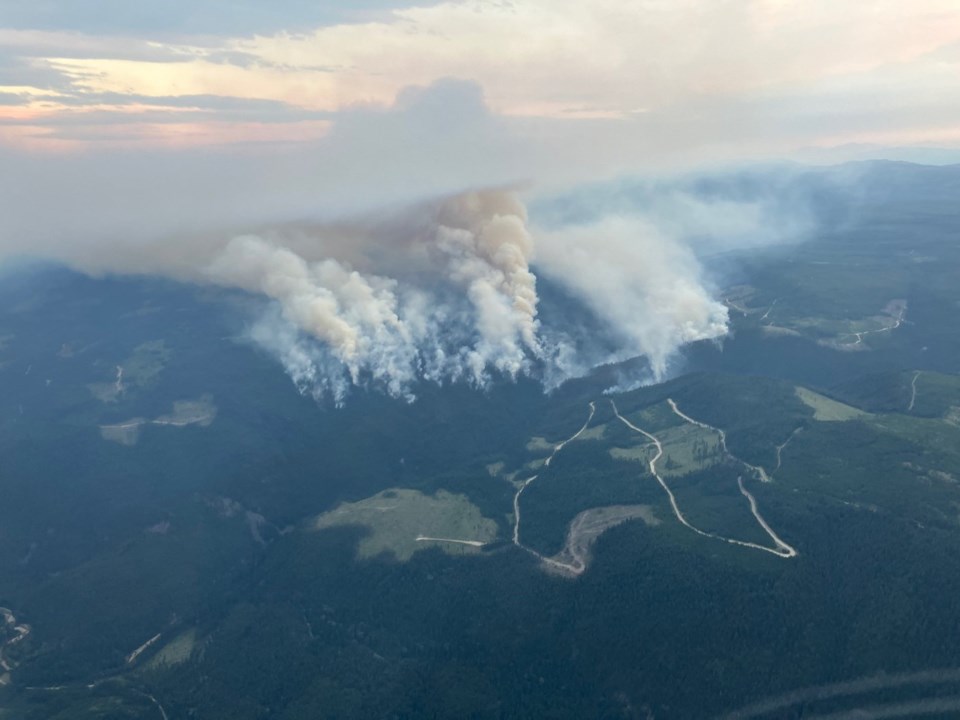The mayor of Slocan, B.C., says the skies were filled with ominous thick smoke while she drove out of her community that's now under an evacuation order as wildfires burn on either side.
Jessica Lunn says most of Slocan's approximately 370 residents had already left Sunday morning, as she and her family evacuated and firefighters set up sprinklers to protect structures and prepared to pump water from the nearby lake.
"I did a drive through the community, through the village, looking, and most people had left by that point," she said.
"And it just seemed, you know, there was that quiet ominous feeling of just thick, thick smoke."
The Regional District of Central Kootenay announced Saturday the evacuation order would take effect Sunday morning after fire officials warned a warming and drying trend in the region meant fires in the area would see more activity.
A statement from the regional district said the unique topography of the area about 370 kilometres east of Kelowna presented, "significant direct attack safety challenges," and that projected fire behaviour led officials to recommend the evacuation.
The order covered all 208 properties in the village and 309 properties in the surrounding area.
Lunn said being able to give people notice ahead of time was a silver lining and helped officials organize a bus for those who couldn't leave to take them to an evacuation centre in Castlegar, B.C.
"That did give the community some time to prepare, even though most families and individuals already had a plan in place, because we had been on (evacuation) alert," she said.
Jason Lawler, the incident commander in charge of fighting six significant fires around Slocan Lake, including the Ponderosa and Mulvey Creek wildfires burning near the village, said they pose a potential risk to both the community and firefighters.
He said the area has been dealing with a hot, dry period for a long time, as well as gusty winds and low humidity.
Lawler said the fires are in steep terrain with lots of dry wood for fuel, which can make them difficult and dangerous to access.
"It's dangerous to crews, the fire itself and how quickly it can pick up should the winds change. But it's also incredibly dangerous for other hazards including tree fall," he said.
Lawler said there are about 300 firefighters on the ground fighting the complex of blazes and aircraft have been strategically placed, though the heavy smoke has limited how much planes can be used.
Dan Elliott, an information officer with the regional district, said the community has come together to support each other.
"In the sense of this being a super stressful, scared, frustrating, emotional time, the community has really come together trying to provide support for one another," he said.
"Whether it's helping with transportation, dealing with animals or anything they can do for one another."
Elliott said the latest evacuation orders were among a series in place in the regional district which covered a total of 1,026 properties.
Lawler said it's too soon to estimate when people might be able to return home.
Lunn said the situation feels surreal and she's hoping winds stay calm and rain arrives.
"No matter which way the wind is blowing, it's affecting somebody. So what we need is that rain, the water, and calm — no winds."
The evacuations came as cool and wet weather helped fight fires in other parts of the province.
A provincewide situation update posted Sunday by the BC Wildfire Service said risk levels have decreased in other parts of B.C., reducing fire behaviour on some of the province's other major blazes.
This report by The 91ԭ�� Press was first published July 28, 2024.
Ashley Joannou, The 91ԭ�� Press



